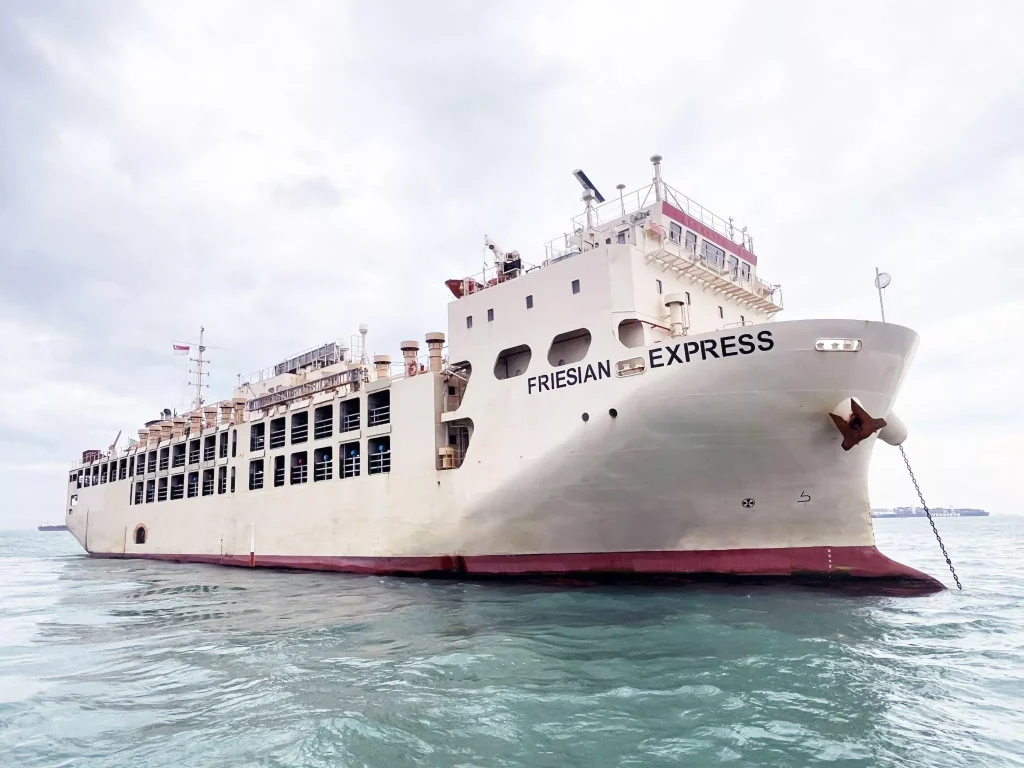
The Friesian Express. Source – Vroon.
LIVESTOCK exports via sea had a positive and long-term future if sub-standard vessels and operators are forced to exit the market, a world leader in the trade has claimed.
The Dutch company Vroon recently expanded its Livestock Express division fleet with the purchase of the MV Aurochs from the Tsuneishi Group.
MV Aurochs is the 13th vessel in the LE fleet, and has been renamed Friesian Express. The vessel was purpose-built in 2017, is the youngest livestock carrier operating in the global market, and recently departed Australia on her maiden voyage under Vroon ownership.
Vroon group legal manager Christopher Savoye said a consistent, strict and enforceable regulatory framework is critical to achieving the trade’s.
“Our key concern would be that countries without strict regulation fail to implement new regulation creating an uneven playing field.
“This would ultimately be at the detriment of animal welfare on a global level as export volumes shift from regulated to non-regulated countries,” he said.
Mr Savoye said Vroon has been active in the live export industry since 1964 and it is considered one of the group’s core markets.
“Trade patterns shift and change over the years as do business cycles.
“Whilst most Livestock Express vessels are certified to transport sheep from Australia we have predominantly shipped cattle in recent year,” he said.
“The Friesian Express is a natural fit to the current Livestock Express fleet.”
He said Friesian Express is the youngest Australian approved vessel and reduced the average age of the fleet, that now contains eight vessels build between 2013 and 2016.
“The Aurochs was under our commercial management since 2020 so we already had a profound understanding of her capabilities and performance.
“With the acquisition we can continue to offer a wide variety of options to our clients with the Friesian Express being particularly suitable to service niche trades in South East Asia where there is a preference for small consignments,” he said.
Mr Savoye said Australia remains the most strictly regulated country in the world when it comes to livestock carriers and operating costs are considerably higher as compared to vessels that trade in less strictly regulated areas.
“The high operating costs combined with tough trading conditions in recent years has resulted in a reduction of vessels approved to trade from Australia.
“Livestock Express firmly believes that there will demand for modern, purpose-built livestock carriers able to transport livestock in safe manner and up to the highest animal welfare standards.”
On the potential banning of livestock exports from major livestock-producing countries, Mr Savoye said livestock producing countries such as Australia have an important role to play in the world when it comes to food security.
“Especially when you consider its geographical proximity to the Asia Pacific region with expected population growth in the years to come.
“The live export industry and our vessels have an important role to play in this,” he said.
“We have invested heavily in assets that assure the safe transportation of livestock up to the highest animal welfare standards.”
Mr Savoye said Livestock Express predominantly ships cattle.
“We have however observed a significant increase sheep trade from EU to the Middle East in recent years.
“Unfortunately most vessels on this trade are of questionable quality flying grey or black listed flags,” he said.
What is the cattle and sheep capacity of the current Vroon livestock fleet?
AI has a role to play
Livestock Express’ 13 livestock vessels have an annual volume of 600,000-750,000 head of livestock.
“Whilst most of our vessels are capable to transport sheep from Australia we have not exported sheep from Australia for a number of years as sheep-shipments typically are conducted on larger sized vessels,” Mr Savoye said.
“As a premium operator operating in strictly regulated markets, Livestock Express has and will always focus on animal welfare.
“It is the key performance indicator and the reason our clients entrust their livestock to our company for transportation,” he said.
“Our vessels are purpose-build with the livestock at the centre of its design and with more safety systems and redundancy (for e.g. power supply, water production, ventilation and cargo hold cleaning systems) than seen on any other livestock vessels.
“Equally important is the training of crew and ensuring a minimum level of experience is present on board,” Mr Savoye said.
“We are proud to have a loyal crew pool and this is an important element of our service delivery.
“We also believe technology has a role to play,” he said.
“One example is the implementation of predictive maintenance for our machinery, where AI technology combined with sensor data can detect anomalies that can be addressed before they become issues.
Mr Savoye said one of the main risk factors in the international livestock shipment trade by sea is sub-standard vessels and operators conducting significant volume of business and even taking business away from strictly regulated countries.
“This is a major risk and concern for the trade.
“Live export by sea can be conducted safely, but it requires high standards throughout the supply chain.”
“When it comes to livestock transportation we would welcome stricter regulation and enforcement to create a level playing field and ascertain the safety of any vessel transporting live animals.
“Loading densities should be part of such regulation, but evenly important is the monitoring and enforcement of such regulation.”

HAVE YOUR SAY